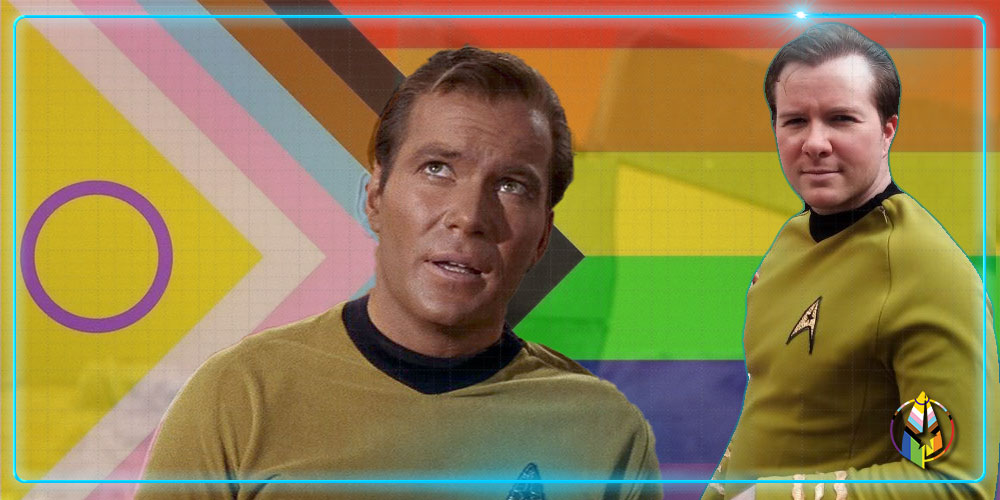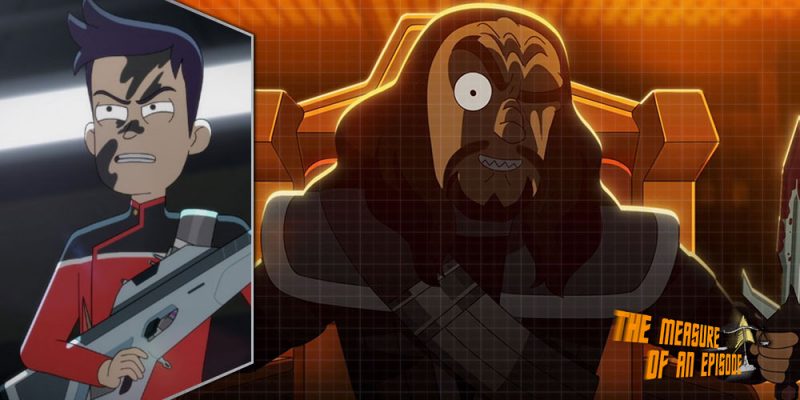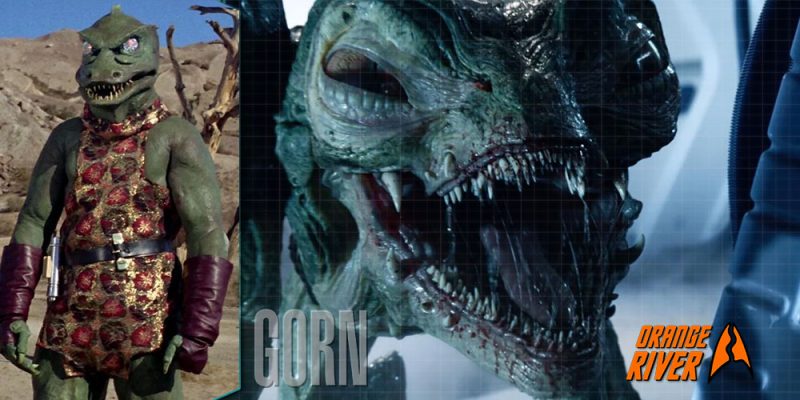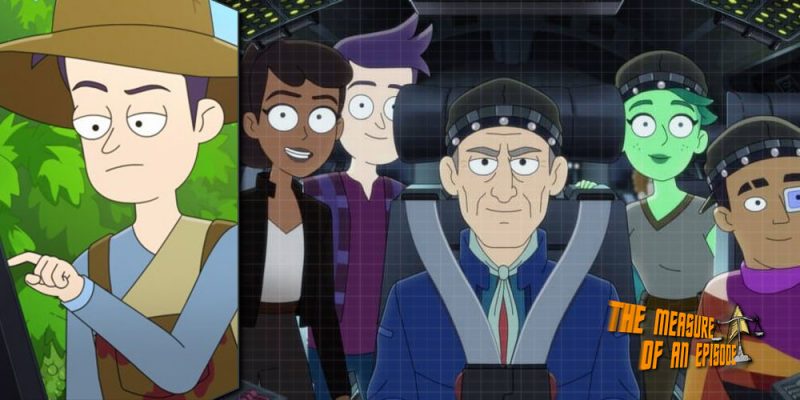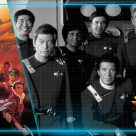James T. Kirk. One of the most famous fictional characters of televisual literature – and also one who has become part of my reality (or I his). On the surface, the reason might be clear. Underneath, the story is more complex – as is the character – than people might think.
I am an actor, with an interesting history. Let’s just say, I didn’t start off looking like a young William Shatner; a perk, among the challenges, of the genetic hand I was dealt. The earliest comparison was entirely unintentional and not, in fact, aesthetic.
Years ago, after running an improvised Star Trek scene in a workshop, in which I played ‘Kirk’; a character I knew little of and had 5 minutes to prepare for, I recall a respectful room of silence and my tutor saying, ‘does your agent know you can do that?’.
In recent years I properly discovered Star Trek, just as I was hitting the gym, gaining 11kg of weight, and relinquishing the long hair and beard that disguised my potential for many such roles. I remembered that workshop and things clicked.
When lockdown happened, cabin fever ensued and rather than sensibly rebranding myself for a more diverse folio of roles, I literally just…became Captain Kirk. The rest, as they say, is…well. Yet to come, I guess.
The truth is, Kirk became a character who I loved and had meaning for me. He surprised me. This is a key thing. The initial impression was not as pop culture would have me expect, nor a version I would so easily and willingly have stepped into the shoes of, in any sense.
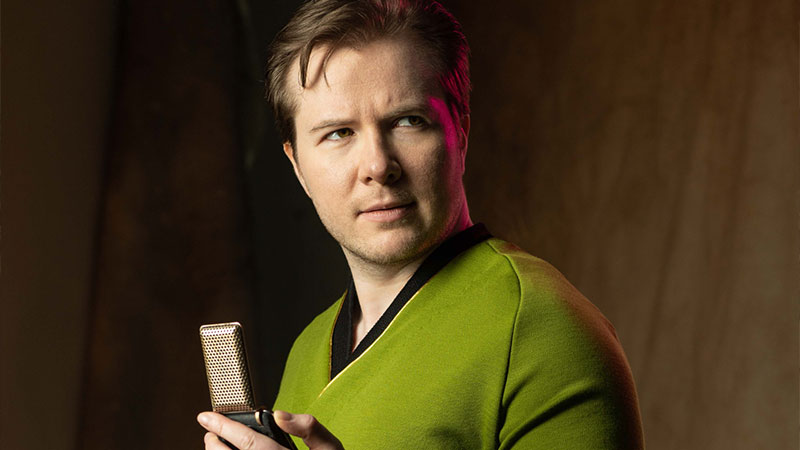
I see Kirk both praised and derided by opposite ends of a spectrum for the same inaccurate impressions: a cultural Mandela-effect that has its own unique term: the Kirk Drift. I have read that the misrepresentation of his character has needlessly put people off from engaging in the material, only for people to find later they’d overlooked something of value.
The myth of Kirk as a misogynistic skirt chaser flies in the face of the character’s actual manifestation on screen: a flawed yet passionate man with emotional integrity and a default stance in defence of equality. Shallow readings will miss the point of an episode where Kirk risks his ship for the worth of three women, whom he refuses to see traded as property, nor leave until he’s made sure at least one has some notion of her own worth and autonomy.
James Kirk is more often placed in coercive, non-consensual situations in which he is a victim than he is a romantic actuator for no reason other than his own gratification. Read Erin Horáková’s essay for the complete takedown. I’m glad the pop culture parodies didn’t divert me from the journey of discovery it would become.
As I have learnt, and experienced first-hand, the character is, on the whole, blessedly seen and appreciated by a contemporary generation, and for reasons that might seem sometimes surprising, though on analysis, are deeply insightful and keenly aware of the source material.
A lot of that has to do with how unique one can argue Kirk is – and specific. Just as unique and specific as Spock. Kirk is not simply ‘just some guy’ – this, is perhaps the myth I’d like to bust. Something makes Kirk both memorable and identifiable across a broad spectrum, of many demographics, including different genders and sexualities, all at the same time.
And this character, precisely as he is, as wholly and suggestively multi-dimensional as he is, is one of the most famous in television history. He is, in this sense, singularly fascinating.
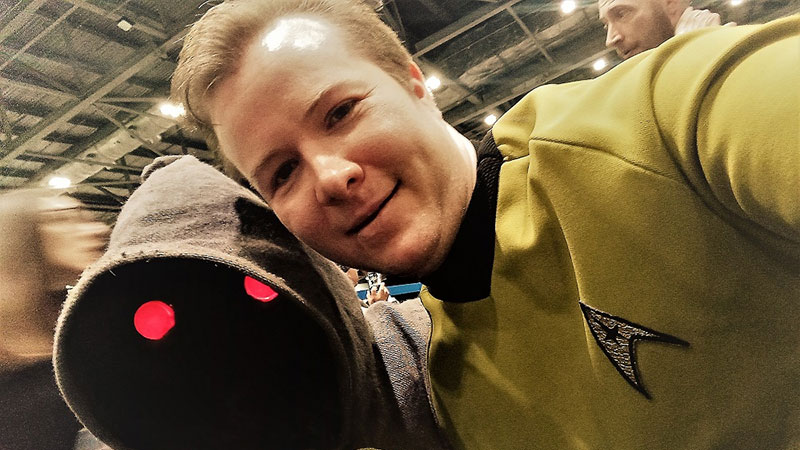
Who we are?
Across cultures and history, masculinity and femininity are quite prone to interchange, and we all have our own unique sense of self: how we feel in our bones can’t always happen to coincide with the ideals of the time. I know a terrific actor who is tall, muscular and wears skirts.
By embracing the ‘feminine’, he implies he can more completely and authentically express his sense of masculinity. By intention or not, Kirk, the 23rd-century man, echoes something similar, especially through the lens of today.
Some of it is in how the character is written and portrayed; how he is adorned with Bill Theiss’ wonderful costume design connects to this. With the tactile, body-hugging, soft wool plunge neck wraparound, gentle features, golden eyes, and golden hair, he is (to paraphrase something I heard said long ago) oft described as beautiful in the way women are – and yet, is wholly masculine.
I feel, like the skirt-wearing warrior of my acquaintance, that when I don these clothes – including the glittery pants; the heeled boots – it expresses my masculinity, as I see it, and experience it; and it reads so, regardless of the coding of the elements.
Most people don’t look at Kirk and see the components because the whole communicates more than the sum of them. It was a lightbulb moment for me; that of all things, Kirk was the character that revealed a format of masculine fluidity and possibility I’d never been able to quite grasp til that point.
I can wax lyrical, but I have people writing to me about how important it is to them also; how much they notice this character’s embodiment – with such specificity and detailed observation it does make me think when it’s overlooked it perhaps should not be.
Trans fans write about how Kirk’s body helped them feel less dysphoric about their own: to quote one person “Seeing TOS Kirk and the love of his shape by fans has positively impacted my own self-image in ways I can’t even express”. Words after my own heart. The straight cis guy intently asking if I have the ‘Kirk Curve’ – and his utter delight when I finally figured out what he was talking about and turned sideways (yes, I do).
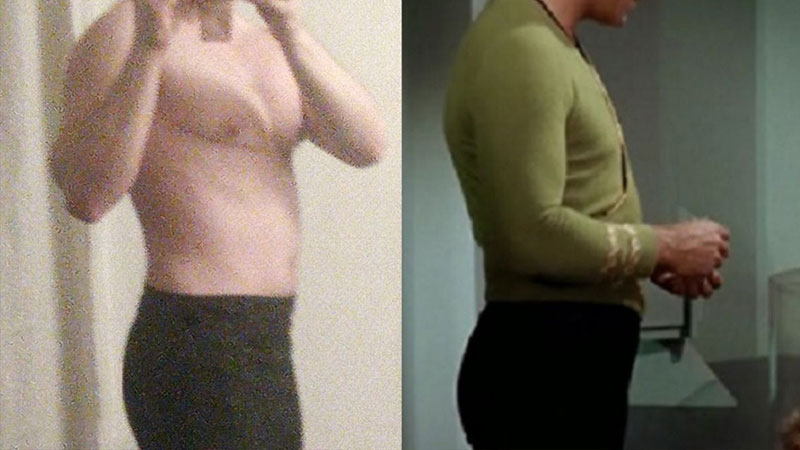
Kirk is not actually a radical departure, but he reflects the reality of those observing him. He’s certainly not today’s much-repeated six-foot, ultra-jacked comic book hero: he does have a different form, distinct to and expressive of him – and this is the strength.
This is part of what had made him so universally appealing. Poetically, the form follows character: body and heart are inexorably linked. Especially when you study the multitudes of fan-created art pieces and textual explorations, you get a strong idea of how his embodiment is a fundamental part of his textual persona. Bold, strong; yet curves and softness; in personality, he’s commanding, passionate, emotional, and tender.
The character as a whole is a symbol, a rainbow motif. A friend once remarked ‘Kirk is ALL the gender’ – in the sense that his embodiment of maleness is an uninhibited spectrum; it incorporates elements also often associated with the feminine, uniting to convey his specific masculinity – or, perhaps, an unlabelled sense of self that is uniquely his.
Some people rationalize reinventing him on the basis of relevance, claiming that he was then an ‘ideal’ of the era, and he should now reflect today’s ‘ideal’. I’m not sure I agree, on either count. And isn’t dictating an ‘ideal’ a bit regressive? Does that really sell? Why do fans write to me applauding a faithful representation? Why is this important to them, across the board? He doesn’t strike me as ever being wholly conventional or conforming in his time – and, it seems, was never intended to. I recall an interview from the late ’70s with Bill Boggs when Shatner himself was talking of Kirk’s overall persona, to quote: “Star Trek, and perhaps myself, had something to do with trying to change [gender expectations]”.
This isn’t a new take. This is how he always was. Consciously or not, it’s all his exacting, poetically harmonious characteristics, that make him Kirk, as opposed to some other guy; his character is entwined with his embodiment, which together has made the character continually memorable, appealing and relevant.
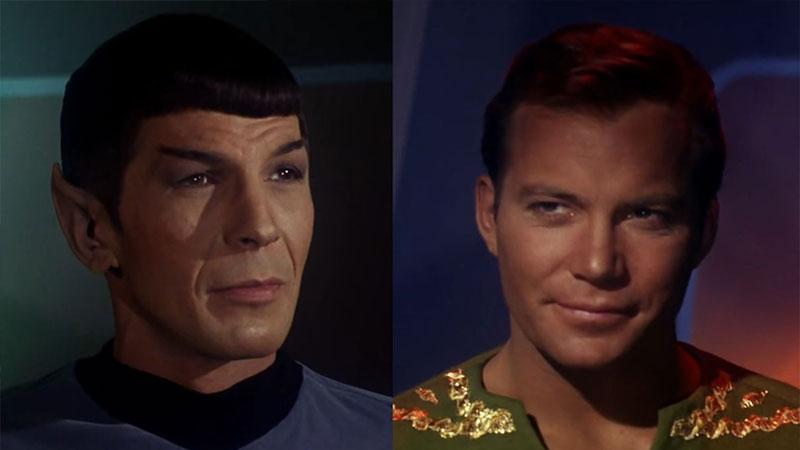
Who we love?
“We never suggested in the series… physical love between the two. But we certainly had the feeling that the affection was sufficient for that” – Gene Roddenberry
In brief, understanding the multifaceted, unforgettable relationship Kirk has with Spock is also an essential part of grasping these characters’ underpinnings. The original series is steeped in this relationship: countless moments of subtle, spontaneous chemistry; beautiful photography, thoughtful editing and poetic allegory that are a masterclass on how a script transforms through the creative filming process and various artists’ hands.
The definitive piece, and its meaning, are in the final print. And then the viewer becomes co-author in their interpretation of it. My notes on this form the PhD I never did. This, not actually Kirk, cemented my passion for the original series.
The narrative itself posits Kirk and Spock’s relationship as a profound friendship framed by classical literary romanticism. Perhaps we recognize or identify best that which we are familiar with: I grew up seeing enduring love relationships based on strong friendship; it was a tune I recognized.
From the subtlest of moments in “The Enemy Within” – where, during an apt analysis of the characteristics that maketh a man, and denoting ‘love’, the camera cuts to Kirk raising his eyes to Spock’s as the edit cuts between them for a significant beat – to how the overall series narrative compellingly outlines definitions of love, in “Metamorphosis”, “Dagger of the Mind”, which are then fulfilled uniquely by the two for each other.
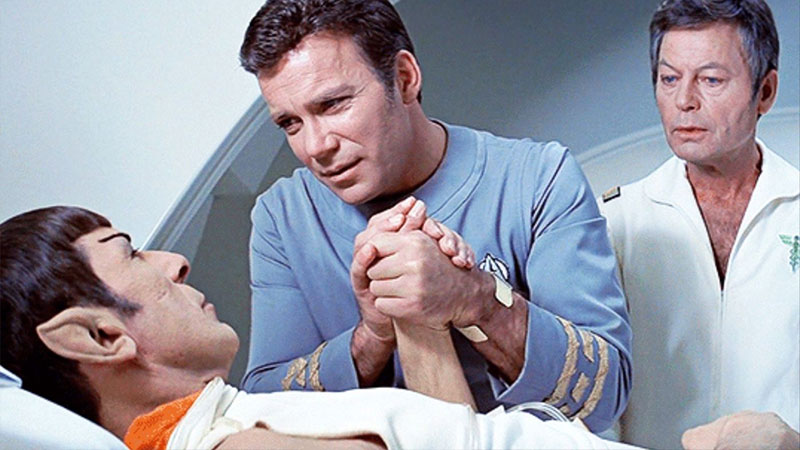
I started my Trek with The Motion Picture, in which the obvious parallel between Decker and Ilia/V’Ger, and Kirk and Spock, is a beautiful device in a sweepingly evocative context.
Star Trek II-III’s Orpheus and Eurydice-esque arc where the “nothing is more important than my ship” Enterprise burns so Kirk can cheat his way to hell to save his mate-soul. Few moments are so epic, nor carry such meaning. “At his side, as if you’ve always been and always will”, is their gravitational constant. The implication made by Kirk that their souls are the same is an essential character study.
Their bond, in both modesty and grandeur, reflects on the entirety of their personas, their history and their future. In many ways, literal and metaphoric, it’s the heart of the original Trek. And seeing it, was transformative in more ways than can possibly be described. Once again, while proffering something many can identify with, it’s something that transcends gender and categorization.
I’ve barely scratched the surface and my count is up; though it certainly won’t be the last time I reflect on this character, or his soul, as he accompanies me in my own trek among the stars. It’s a shame, though, that sometimes Kirk feels a creation oft re-written or re-imagined in place of the involved task of decoding.
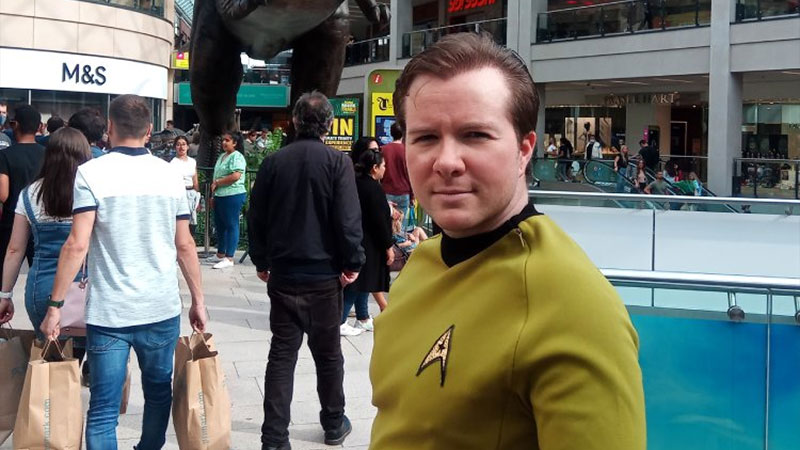
Or simply observing and embracing his specificity, his quirks; perhaps even his queerness – of understanding its relevance and significance to his character; that which makes him unique, memorable, and specifically James T. Kirk and not, in fact, your standard, malleable male lead. He’d never have survived so well by the fandom if he was.
Nor is it about doing an impression of Kevin Pollack William Shatner; there’s a difference between being an impersonator and being an actor with a close casting and the appropriate polish.
In a difficult time, I identified a character I knew I could portray, who was kind of just ‘me’ – I joke that ‘my gender is Captain Kirk’ as it somehow helps me express some of my own truths. As ironic as it sounds, I put on the costume and feel seen.
As another famous Bill once quoted “all the world’s a stage” and so it must be. Perhaps a little madness can keep one sane – and make a lot of people very happy; an interchange that has really kept me inspired, and afloat, and I hope it continues.
Article written by – Ed Zephyr – Pronouns: Boldly/Go
Twitter: @EdZephyr (https://twitter.com/EdZephyr)
Facebook (https://www.facebook.com/edzephyr.official)
Tumblr (https://edzephyr.tumblr.com/)
Represented by darren@dchmanagement.co.uk
Spotlight / IMDb

